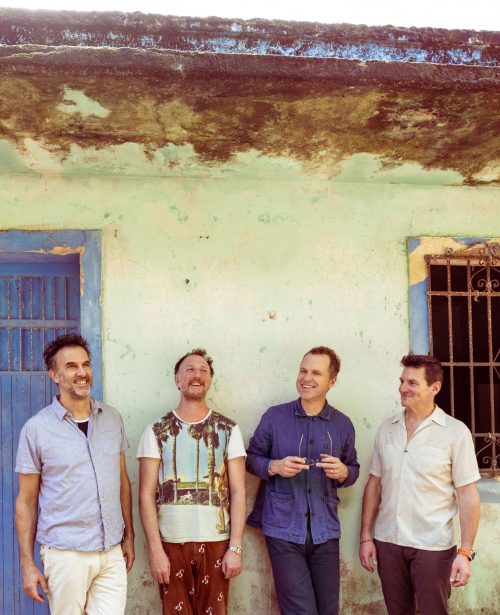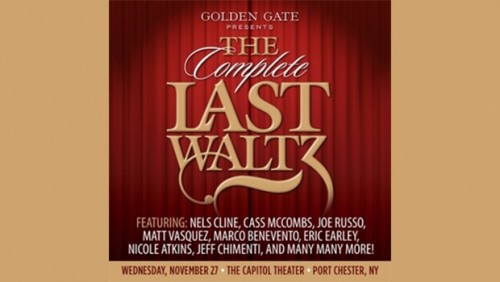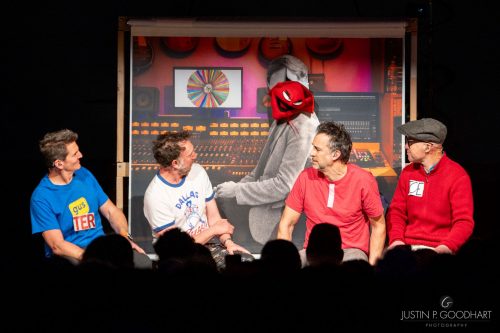With scripted skits and set changes, Guster’s We Also Have Eras tour tells the 30-year tale of the band in two and a half hours.
Asked if he’d like to see one of his favorite groups try to pull it off, here’s what drummer Brian Rosenworcel had to say: “I mean, if I’m just casually going to a concert and this happens, I’m like what the fuck. But if I’m a deep fan of a band that I’ve seen 10 or 15 times, and that is the case for a lot of our fans, I’m like hell yeah. So many people have come up to us and been like, ‘Thank you, this was above and beyond.’ Sometimes the band is actually having so much fun on stage that we’re having a better time than the audience.”
The tour is one of three big milestones this year for the band that formed at Tufts University near Boston in the early ’90s, the other two being the 25th anniversary of “Lost and Gone Forever,” their landmark third album, and the release of a new LP called “Oh La La” on May 17. They’ll mark the 25th year of “Lost and Gone” with a sold-out show featuring the Colorado Symphony at Red Rocks in August as well as at their own On The Ocean festival in Portland, Maine, later that month and at the Ryman in Nashville in September.
Rosenworcel, along with fellow founding members Ryan Miller (vocals, guitar) and Adam Gardner (vocals, guitar) plus longtime multi-instrumentalist Luke Reynolds will put on their We Also Have Eras tour at the newly reopened Brooklyn Paramount on Friday, March 29, with opening act Fruit Bats.
We chatted with Rosenworcel about the new album, the old album, the tour and how and why Guster is what it is.
How do you feel about “Oh La La”?
I still like it and it’s been five years in the making, so I mean that’s a good sign. It definitely feels like there are a lot of layers to it, so even though it’s only 10 songs and it took five years, there’s a lot to dig into there and things to discover, so I feel proud of that, and also like we can’t wait five years before the next one.
You’re promoting the new album while you’re doing a career retrospective tour, so I thought it would be interesting to ask about how the way you made records back then compares with how you made “Oh La La.”
“Lost and Gone Forever” was unique in that it was like just easy, upbeat, quick, seamless. We were all so enamored with Steve Lillywhite, he just was pumped. We had all the songs we needed, and everything came out great, and we didn’t realize that the next three records — “Keep It Together,” “Ganging Up on the Sun” and “Easy Wonderful” — would all involve being rejected by the label, having to write a whole second batch of songs.
It was a challenge to make this record because we went in with half-written songs and we were just just excited to be creative while the world was crumbling. We figured out a way to get some of us in the studio, if not all of us due to our COVID experiences and various geographies, and just to get working on things, so that we got to the finish line is definitely a point of pride and doesn’t mean the process makes sense.
Could you describe the format of this tour? The title with the nod to Taylor Swift’s Eras tour is pretty clever.
The only thing is that Taylor Swift is in the title. I’m the only one in the band who’s a Swiftie so that’s not really relevant. But we use the idea of eras to kind of imagine a show that was chronological and had some story involving like literally backdrops and scripts and theatrical, like full Broadway, stopping and pausing with every album, doing a lot of projections. The end result is that people get to actually witness our musical evolution, so when you start, you start in the dorm room with acoustic guitars and you wonder, well how do they sound like like our song “Keep Going” from our new album and how did it get there? You actually witness the step-by-step, song-by-song transformation of a band, and I find that to be like really cool, and also we think we’re funny. For us at age 50 to be memorizing lines and doing all these new exciting things, it’s pretty fun. It keeps us really plugged in.
My observation is that Guster’s music is very accessible yet it’s still not in the mainstream and it’s not easily categorized. React to that if you will.
Yeah, I mean, it’s like a lot of people have heard of us but we’re not a household name. We’ve always kind of been like successful, but like you say not mainstream, and it’s only because we never got a hit song in the way that so many of our contemporaries have hit songs, and we dig into that actually in one of our skits (laughs), but you know, that has served to keep us motivated and keep us feeling like, I don’t know, like the path that we’re on all has been merit, based on our fans and based on our touring experience. We’re really very focused on what we’re doing in that, and that’s never been more evident than this show, which really has never been attempted.
Guster has been at this for a long time, but is there a sense of excitement or pride or something when your tour includes dates at Red Rocks, which is sold out, The Ryman and Newport Folk Festival?
I always wondered why we never got asked to play Newport. I don’t care that much, but to have it come around, there’s something validating there. Like, I know the music’s good, I know it’s gonna hold up, our fans have been listening to it for 30 years, and I know we’ve always held ourselves to a high standard of melody, so it’s nice to be recognized, nice to be playing Oceans Calling and Sea Hear Now, Newport Folk Festival, all these kind of big events where a bunch other people get the chance to check us out.
How do you approach festival dates where many of the people there didn’t come to see you specifically?
We always looked at that as an opportunity, and back in the day, yeah, I felt like we could go over on anyone by me just hitting the drums harder, and I don’t know if actually that was true. I think we can write a festival set that people with a misconception of what Guster sounds like…obviously the sound has evolved. Because they saw us listed in the Wetlands they thought we were a jam band, and that could not be more far from the truth — we don’t have an improvisational bone in our bodies. And some people are surprised that it sounds kind of like ‘70s soul, or you have this song that sounds really kind of like Depeche Mode.
Who do you consider to be your peers, whether it’s people you came up with or people you’re kind of out there with now.
People out there touring who are like simpatico with us, they’re not really playing anymore, but Dr Dog was always a band that we looked up to, and we have this guy who’s opening for us at Red Rocks called Kevin Morby, his music reminds me of Dylan and Lou Reed but also it’s his own thing. And the Fruit Bats opened our last two shows, and Eric [Johnson] has been out there for so long and finally getting recognized.
You talked about albums being rejected and things like that. How has the fact that record sales are not as important as when you were starting out, is it sort of freeing that you’re not as concerned or I don’t know how concerned you were back then, but is there less pressure?
You kind of answered your own question right there. We never made a penny [on our albums] really, so it’s more like a tool to help fuel our touring lifestyle. I mean getting a song on the radio or whatever helps expose people, but every time we make an album, it’s like everybody cares very deeply about every song, and we fight about it to the death, but it’s not because we want to sell the album for profit. We gave up on that from the beginning and we’ve sold over a million albums. It’s amazing how the accounting of record labels is conspired to always be offsetting their promotional costs. But I’m way over it, you know. Playing live in a world of AI and in a world where we experienced the pandemic, playing live as a band and having that as your skill set feels like the better skill to have.
Photo by Alysse Gafkjen




Leave a Reply